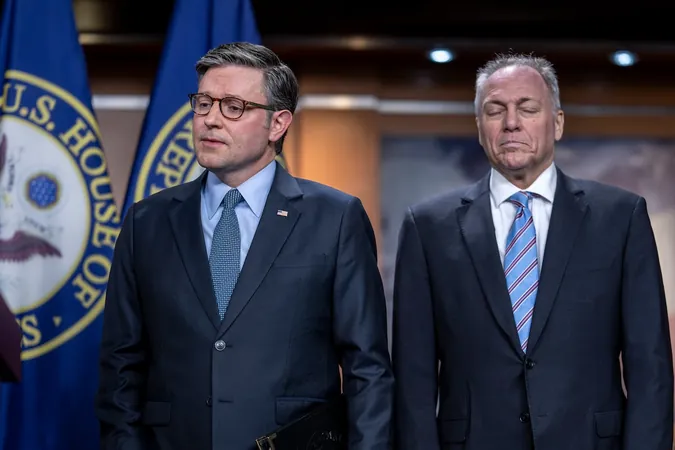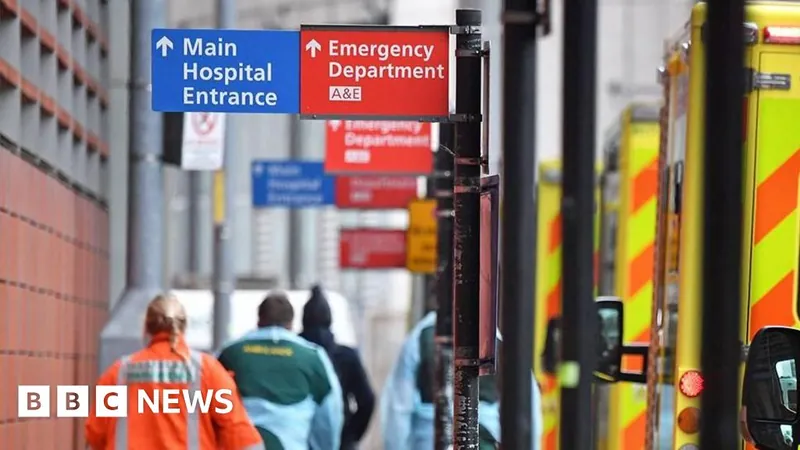
Trump Returns to the Spotlight as Republicans Unite to Avert Government Shutdown
2024-12-19
Author: Michael
Introduction
In a race against the clock, Republicans in the U.S. Congress announced on Thursday that they have forged a new spending package aimed at preventing a government shutdown, buoyed by the endorsement of president-elect Donald Trump, who had previously derailed a bipartisan proposal.
Details of the Agreement
Republican Representative Tom Cole, chair of the committee overseeing spending, confirmed the agreement, stating, 'There’s an agreement,' though uncertainty looms over whether the House will successfully pass the vote scheduled for 6 p.m. The slim margin of Republican control—219 to 211—means they can afford only three defections if Democrats line up against the bill.
Democratic Opposition
Top House Democrat Hakeem Jeffries criticized the plan as 'laughable,' and during a closed-door meeting among Democrats, attendees could be heard chanting in opposition. The divide between the parties is palpable, highlighting the tension as both sides gear up for a struggle over budgetary priorities.
Possible Consequences of a Shutdown
If lawmakers fail to reach an agreement by the Saturday deadline, a partial shutdown could ensue, disrupting government services right before the holiday season and threatening paychecks for over 2 million federal employees. Agency officials, such as those from the Transportation Security Administration, have warned that travelers could face extended wait times at airports.
Trump's Role
Trump, meanwhile, is positioning himself as a decisive figure in the negotiations, pushing for a swift resolution before assuming office on January 20. 'Now we can Make America Great Again, very quickly,' he declared, stressing the urgency of finalizing the deal.
Spending Package Provisions
The proposed spending package aims to fund government operations for three months, stretching into Trump’s administration while Republicans dominate both the House and the Senate. It also allocates $100 billion for disaster relief and $10 billion for agricultural support, alongside the extension of essential food assistance programs which were on the brink of expiration.
Debt Ceiling Suspension
Notably absent from this revised package are provisions that previously garnered attention—such as a potential pay raise for lawmakers and alterations in pharmacy management rules. Furthermore, the bill includes a suspension of the debt ceiling until January 2027, a move that could lead to an increase in the existing $36 trillion federal debt without immediate fiscal restraints. This shift comes after Trump moderated his earlier insistence on complete elimination of the debt ceiling.
Economic Implications
The implications of failing to regulate the debt ceiling could be significant; previous standoffs of this nature have rattled financial markets worldwide, where a government default could spell trouble across the global economy. Although the suspension agreement expires on January 1, most lawmakers expect to postpone any decisions on this topic until spring.
Trump's Fiscal Policies
As Trump prepares for his return to office, he has signaled intentions to implement tax cuts projected to decrease revenues by up to $8 trillion over the next decade without accompanying spending reductions, further complicating the fiscal landscape. Democrats, like Jeffries, have reiterated that the debt ceiling should not overshadow the immediate need to protect citizens from the fallout of a government shutdown.
Internal Republican Tensions
Amidst this political chaos, House Speaker Mike Johnson faces potential unrest within his ranks, particularly from Republicans disillusioned with his leadership. Some party members have threatened to withdraw their support, leading to fears of another contentious leadership struggle as the new Congress convenes.
Support for Leadership
Notably, Republican Representative Marjorie Taylor Greene voiced passionate support for standing firm against what she termed 'the madness' of potential government paralysis, hinting at a willingness to pursue new leadership if necessary. Trump offered his conditional backing for Speaker Johnson, asserting that decisive action against perceived Democratic traps could secure his position.
Conclusion
With the deadline fast approaching and tensions rising, all eyes are on Congress as the stakes of these negotiations grow higher than ever. The implications of their decisions will not only affect government functions but also set the tone for Trump's impending presidency and the future of the Republican Party. Will they unite or will division reign? Stay tuned!









 Brasil (PT)
Brasil (PT)
 Canada (EN)
Canada (EN)
 Chile (ES)
Chile (ES)
 España (ES)
España (ES)
 France (FR)
France (FR)
 Hong Kong (EN)
Hong Kong (EN)
 Italia (IT)
Italia (IT)
 日本 (JA)
日本 (JA)
 Magyarország (HU)
Magyarország (HU)
 Norge (NO)
Norge (NO)
 Polska (PL)
Polska (PL)
 Schweiz (DE)
Schweiz (DE)
 Singapore (EN)
Singapore (EN)
 Sverige (SV)
Sverige (SV)
 Suomi (FI)
Suomi (FI)
 Türkiye (TR)
Türkiye (TR)